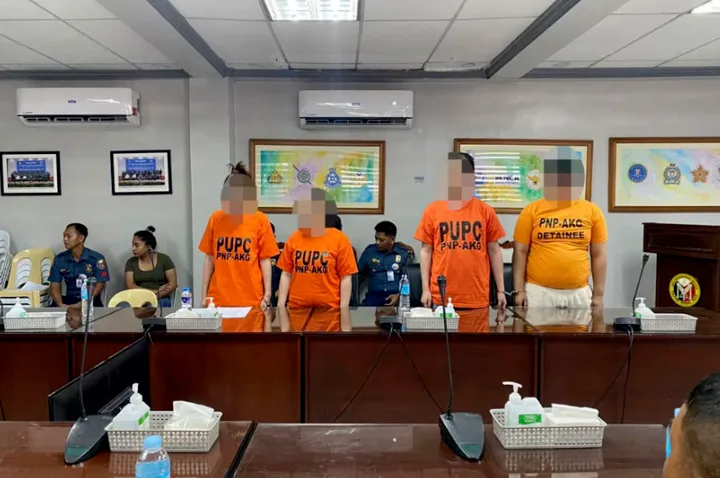Recently, the incident of two Chinese medical device executives being kidnapped and killed in the Philippines has caused a stir.
In fact, this is not the first time that Chinese people have been kidnapped in the Philippines. Why was it unknown before, but this time it made the hot search?
On one hand, China had just finished a skirmish with the Philippines at Ren'ai Reef, which is too easily understood by netizens as an underhanded retaliatory action.
On the other hand, the kidnappers still killed the hostages after receiving 3 million from the family, which is really dishonorable.
So, what exactly happened in this kidnapping incident? What's the inside story? Let's have a good talk about it today.
One
Let's first restore the case.
There are two victims:
One is Xia, a graduate of Hunan City College, who was once named the outstanding graduate of the College of Materials and Chemical Engineering in the past 15 years. After graduation, he worked in the medical device industry and has been working in a domestic medical device company listed in China, serving as the director of international marketing, only 39 years old.
The other is Sun, a Chinese American, who once worked in a multinational medical device company, responsible for coronary stent business. After the centralized procurement of stents, he started his own business, beginning to act as an agent for heart valves and IVUS (intravascular ultrasound).
It can be said that although the two are not the so-called "pharmaceutical company executives" in rumors, because the stents, valves, and balloons they sell are all high-margin products, they are definitely successful people.
Since they are engaged in the sales of cardiac medical devices, traveling around to attend exhibitions and expand the market naturally became their main task.
Note that initially, Xia and Sun did not know each other.
On May 14, Xia and Sun flew to France to attend the European Congress of Interventional Cardiology (EuroPCR).
After the conference, Xia attended a gathering of Chinese exhibitors, where he met Sun.
Since everyone is in the same industry, they quickly became familiar with each other, and talking about the fierce competition in the domestic market, Sun introduced Xia to a Filipino businessman—Li Na zona (WeChat name).
Li Na told Xia that her boss was a Filipino Chinese businessman, Mr. Hong, mainly engaged in real estate, with good relations with high-ranking officials in the Philippines, and could obtain the medical device procurement rights from the Philippine government.
Honestly, this temptation is not small.
In the top 10 deadly diseases in the Philippines, heart disease ranks first, accounting for 16.5% of the deaths, so the demand for cardiac medical devices is very high. Last year, the medical device market in the Philippines was nearly 3 billion US dollars.
Of course, the current medical device market in the Philippines is mainly dominated by Europe and America, but with the economic development, the prospects of the Philippine medical device market are very broad. With the scale and price advantages brought by the centralized procurement of Chinese medical devices, as long as they can enter the Philippine market, it would be a killing spree.
In other words, the background that Li Na mentioned is actually true.
Xia was instantly moved and wanted to explore the market in the Philippines.
Then Xia made an appointment with Sun and another colleague to take a trip to the Philippines to see what the market was like.
Up to this point, everything seemed very normal, and no one thought there was any risk.
On June 20, Xia and Sun set off for the Philippines. However, a colleague who had originally agreed to go had to cancel the trip due to a sudden matter, thus avoiding a disaster.
Regarding this trip, Li Na had already assured that they would be picked up at the airport.
However, after Xia and Sun were picked up at the airport, they lost contact.
At 11:36 AM on June 21, Xia's family received a call. Xia claimed that he had lost money gambling in the Philippines and urgently needed his family to send money to help him out, otherwise the consequences would be unimaginable.
Almost at the same time, Sun's family also received a call, with the same script and rhetoric.
Xia's family was very skeptical of this call, because Xia was not a person who liked to gamble. How could it be possible that he lost money gambling and needed money?
After constant questioning, the other side got annoyed, and the kidnapper directly took over the phone to demand a ransom, threatening to kill the hostages if the money was not given, and also emphasized that they were only after money, not lives.
On the family's side, they could only report to the police while trying to raise money to ransom the hostages.
But after gathering 3 million yuan and sending it over, the kidnappers subsequently raised the amount to 15 million yuan. But before the family could gather the amount, the kidnappers' phone could no longer be reached.
On June 24, the bodies of Xia and Sun were found on a beach 100 kilometers away.
The sky of the two families collapsed in an instant.
Although the Chinese ambassador to the Philippines urgently met with the Philippine Civilian Chief and the Chairman of the Presidential Anti-Organized Crime Committee, Bessamin, given the current Sino-Philippine relations, solving the case seems to be a long way off.
Why? Because there are too many kidnapping cases targeting Chinese people.
In May 2022, a Chinese businessman from Fujian, Mr. Lü, was kidnapped in Cebu City, Philippines, and the kidnappers demanded one billion yuan;
In March 2023, Filipino Chinese businessman Lin Wenhui was kidnapped, and despite paying the ransom, he was still killed, with gunshot wounds and signs of torture on his body;

Four suspects in the Lin Wenhui case, three Chinese and one Vietnamese
In April 2023, a group of Mandarin-speaking kidnappers kidnapped businessman Chen, demanded a ransom, and then killed him;
On April 16 of the same year, a Chinese businessman engaged in currency exchange, Mr. Wang, was kidnapped, and after paying millions in ransom, he was released.
The most exaggerated was on October 16, 2023, when Filipino Chinese businessman Chen Wenzhang was kidnapped. The next day, Chen Wenzhang managed to loosen his handcuffs and escape. Afterwards, he revealed that there were 7 kidnappers, including both Chinese and Filipinos.
Who is Chen Wenzhang? He is the vice chairman of the headquarters of the Philippine Chinese Hung Men Zhigong Party and a well-known leader of the Chinese community in the Philippines! Even community leaders can't protect themselves!
The worst was on October 30, 2023, when six Chinese businessmen, including Mr. Zeng, were kidnapped at home. Later, the bodies of four of them were found, and the remaining two are missing, likely with little hope of survival.
By 2024, the number of kidnapping cases has not decreased at all.
In early February 2024, a Taiwanese woman in the Philippines was kidnapped in Parañaque City, Metro Manila, and was released only after paying a ransom.
On the evening of February 18, 2024, a Chinese businessman surnamed Qiu was kidnapped in Manila City. After his family paid a ransom of 40 million pesos and 200,000 USDT, the kidnappers released him. The police confirmed that the GPS signal from the kidnapper's phone was near Chinatown in Manila.
In fact, according to a report by the Philippine National Police (PNP) in 2023, from 2019 to January 30, 2023, there were 102 kidnapping cases in the Philippines, with a large number of suspects and victims being Chinese.
In the report's 102 cases, there were 319 victims, including 214 Chinese, 28 Filipinos, 28 Thais, 24 Burmese, and the rest were from Taiwan Province of China, Malaysia, Vietnam, Japan, and Mongolia.
The report also stated that there were 892 suspects, including 782 Chinese, 80 Filipinos, and others confirmed to be Vietnamese, Malaysians, Koreans, Thais, and Indonesians.
Note that these are only the reported cases. There are likely many more unreported and undisclosed cases of kidnapping.
From the kidnapping case of Xia and Sun, as well as the recent kidnapping cases targeting Chinese people in the past two years, we can analyze some common points:
First, the kidnapping teams mostly involve Chinese participants, even as organizers, who can speak Mandarin and Fujianese.
Second, the kidnappings are concentrated in the Metro Manila area, which is the National Capital Region of the Philippines, consisting of the capital Manila, Quezon City, and the nearby provinces of Laguna, Cavite, Rizal, and Bulacan.
Third, kidnappings often involve harm, and some even kill the victims after taking the money.
Fourth, the kidnapping cases are mostly handled quietly, and most Chinese people are not aware of them. It is only because this time they kidnapped Chinese workers who had just arrived, and given the current tense Sino-Philippine relations, that it made the hot search.
Why is this happening? Perhaps all of this has to start with the black and gray industries in the Filipino Chinese community.
Two
After the incident in northern Myanmar, I believe most people have gained some understanding of the black and gray industries.
But regarding the differences in the black and gray industries spread across Myanmar, the Philippines, Thailand, Cambodia, and Dubai, most people are still unclear.
Simply put, Myanmar is mainly based on telecom fraud, supplemented by online gambling. What about the Philippines? It is mainly based on online gambling, supplemented by telecom fraud. In addition, some money laundering, card selling, human trafficking, and prostitution are actually derived from these industries.
So how did the online gambling industry in the Philippines come about? This has to start with the gambling tradition in the Philippines.
The gambling culture in the Philippines has a long history. As early as when Magellan passed by the Philippines, he discovered cockfighting gambling on Palawan Island in the Philippines.
After the Philippines was occupied by Spain, the Spanish occupiers found that Filipino men were idling around all day going to cockfights instead of working, which seriously affected Spain's revenue. Therefore, they started the first gambling ban in Philippine history.
However, for Filipinos who have gambling ingrained in their bones, they always find various ways to evade this gambling ban. For example, gambling could only be conducted at funerals. Some Filipinos even rented a corpse from the hospital to place next to them for gambling.
After the Philippines was occupied by the United States, the United States learned from Spain's lessons and no longer banned gambling. Instead, they treated it as a charitable activity, managing and controlling it, and even collecting taxes. Isn't that wonderful?
After the Philippines gained independence, after several rounds of negotiations, Philippine President Ferdinand Marcos (the father of the current President Marcos Jr.) signed Presidential Decree No. 1067-A, establishing the "Philippine Amusement and Gaming Corporation" (Pagcor), which manages the national gaming industry and has the privilege of operating casinos and issuing licenses.
Why is Pagcor so powerful? Can it even issue licenses?
Because Pagcor is 100% controlled by the Office of the President of the Republic of the Philippines. Every gaming company must pay Pagcor a regulatory tax ranging from 5% to 20% of their profits.

Although the use of this money is said to be "to create revenue for the Philippine government's social civic and national development plans," it actually ends up in Marcos's pocket.
After Marcos was overthrown and fled, Pagcor was retained because it was equivalent to the president's private treasury, indispensable to any president.
At the beginning of the 21st century, with the rise of the internet, offline gambling began to develop into online gambling. Unsurprisingly, online gambling was soon included in Pagcor's regulation, implementing a licensing system.
However, compared to offline gambling, online gambling has a bug, which is the hosting system.</










